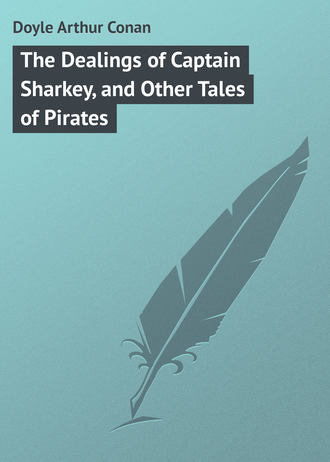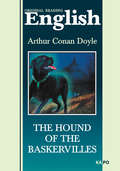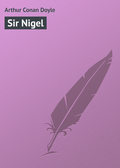
Артур Конан Дойл
The Dealings of Captain Sharkey, and Other Tales of Pirates
"It may be a tragedy," said the robber.
"Oh, I hope not – I'm sure I hope not!" cried the two ladies of the drama.
But the robber was in no mood for further conversation. Far away down the road tiny points of light had appeared. Fresh business was coming to him, and he must not mix his cases. Disengaging his machine, he raised his hat, and slipped off to meet this new arrival, while Miss Flossie and Miss Hilda leaned out of their derelict car, still palpitating from their adventure, and watched the red gleam of the tail-light until it merged into the darkness.
This time there was every sign of a rich prize. Behind its four grand lamps set in a broad frame of glittering brasswork the magnificent sixty-horse Daimler breasted the slope with the low, deep, even snore which proclaimed its enormous latent strength. Like some rich-laden, high-pooped Spanish galleon, she kept her course until the prowling craft ahead of her swept across her bows and brought her to a sudden halt. An angry face, red, blotched, and evil, shot out of the open window of the closed limousine. The robber was aware of a high, bald forehead, gross pendulous cheeks, and two little crafty eyes which gleamed between creases of fat.
"Out of my way, sir! Out of my way this instant!" cried a rasping voice. "Drive over him, Hearn! Get down and pull him off the seat. The fellow's drunk – he's drunk, I say!"
Up to this point the proceedings of the modern highwayman might have passed as gentle. Now they turned in an instant to savagery. The chauffeur, a burly, capable fellow, incited by that raucous voice behind him, sprang from the car and seized the advancing robber by the throat. The latter hit out with the butt-end of his pistol, and the man dropped groaning on the road. Stepping over his prostrate body the adventurer pulled open the door, seized the stout occupant savagely by the ear, and dragged him bellowing on the highway. Then, very deliberately, he struck him twice across the face with his open hand. The blows rang out like pistol-shots in the silence of the night. The fat traveller turned a ghastly colour and fell back half senseless against the side of the limousine. The robber dragged open his coat, wrenched away the heavy gold watch-chain with all that it held, plucked out the great diamond pin that sparkled in the black satin tie, dragged off four rings – not one of which could have cost less than three figures – and finally tore from his inner pocket a bulky leather notebook. All this property he transferred to his own black overcoat, and added to it the man's pearl cuff-links, and even the golden stud which held his collar. Having made sure that there was nothing else to take, the robber flashed his lantern upon the prostrate chauffeur, and satisfied himself that he was stunned and not dead. Then, returning to the master, he proceeded very deliberately to tear all his clothes from his body with a ferocious energy which set his victim whimpering and writhing in imminent expectation of murder.
Whatever the tormentor's intention may have been, it was very effectually frustrated. A sound made him turn his head, and there, no very great distance off, were the lights of a car coming swiftly from the north. Such a car must have already passed the wreckage which this pirate had left behind him. It was following his track with a deliberate purpose, and might be crammed with every county constable of the district.
The adventurer had no time to lose. He darted from his bedraggled victim, sprang into his own seat, and with his foot on the accelerator shot swiftly off down the road. Some way down there was a narrow side lane, and into this the fugitive turned, cracking on his high speed and leaving a good five miles between him and any pursuer before he ventured to stop. Then, in a quiet corner, he counted over his booty of the evening – the paltry plunder of Mr. Ronald Barker, the rather better-furnished purses of the actresses, which contained four pounds between them, and, finally, the gorgeous jewellery and well-filled notebook of the plutocrat upon the Daimler. Five notes of fifty pounds, four of ten, fifteen sovereigns, and a number of valuable papers made up a most noble haul. It was clearly enough for one night's work. The adventurer replaced all his ill-gotten gains in his pocket, and, lighting a cigarette, set forth upon his way with the air of a man who has no further care upon his mind.
It was on the Monday morning following upon this eventful evening that Sir Henry Hailworthy, of Walcot Old Place, having finished his breakfast in a leisurely fashion, strolled down to his study with the intention of writing a few letters before setting forth to take his place upon the county bench. Sir Henry was a Deputy-Lieutenant of the county; he was a baronet of ancient blood; he was a magistrate of ten years' standing; and he was famous above all as the breeder of many a good horse and the most desperate rider in all the Weald country. A tall, upstanding man, with a strong clean-shaven face, heavy black eyebrows, and a square, resolute jaw, he was one whom it was better to call friend than foe. Though nearly fifty years of age, he bore no sign of having passed his youth, save that Nature, in one of her freakish moods, had planted one little feather of white hair above his right ear, making the rest of his thick black curls the darker by contrast. He was in thoughtful mood this morning, for having lit his pipe he sat at his desk with his blank note-paper in front of him, lost in a deep reverie.
Suddenly his thoughts were brought back to the present. From behind the laurels of the curving drive there came a low, clanking sound, which swelled into the clatter and jingle of an ancient car. Then from round the corner there swung an old-fashioned Wolseley, with a fresh-complexioned, yellow-moustached young man at the wheel. Sir Henry sprang to his feet at the sight, and then sat down once more. He rose again as a minute later the footman announced Mr. Ronald Barker. It was an early visit, but Barker was Sir Henry's intimate friend. As each was a fine shot, horseman, and billiard-player, there was much in common between the two men, and the younger (and poorer) was in the habit of spending at least two evenings a week at Walcot Old Place. Therefore, Sir Henry advanced cordially with outstretched hand to welcome him.
"You're an early bird this morning," said he. "What's up? If you are going over to Lewes we could motor together."
But the younger man's demeanour was peculiar and ungracious. He disregarded the hand which was held out to him, and he stood pulling at his own long moustache and staring with troubled, questioning eyes at the county magistrate.
"Well, what's the matter?" asked the latter.
Still the young man did not speak. He was clearly on the edge of an interview which he found it most difficult to open. His host grew impatient.
"You don't seem yourself this morning. What on earth is the matter? Anything upset you?"
"Yes," said Ronald Barker, with emphasis.
"What has?"
"You have."
Sir Henry smiled. "Sit down, my dear fellow. If you have any grievance against me, let me hear it."
Barker sat down. He seemed to be gathering himself for a reproach. When it did come it was like a bullet from a gun.
"Why did you rob me last night?"
The magistrate was a man of iron nerve. He showed neither surprise nor resentment. Not a muscle twitched upon his calm, set face.
"Why do you say that I robbed you last night?"
"A big, tall fellow in a motor-car stopped me on the Mayfield road. He poked a pistol in my face and took my purse and my watch. Sir Henry, that man was you."
The magistrate smiled.
"Am I the only big, tall man in the district? Am I the only man with a motor-car?"
"Do you think I couldn't tell a Rolls-Royce when I see it – I, who spend half my life on a car and the other half under it? Who has a Rolls-Royce about here except you?"
"My dear Barker, don't you think that such a modern highwayman as you describe would be more likely to operate outside his own district? How many hundred Rolls-Royces are there in the South of England?"
"No, it won't do, Sir Henry – it won't do! Even your voice, though you sunk it a few notes, was familiar enough to me. But hang it, man! What did you do it for? That's what gets over me. That you should stick up me, one of your closest friends, a man that worked himself to the bone when you stood for the division – and all for the sake of a Brummagem watch and a few shillings – is simply incredible."
"Simply incredible," repeated the magistrate, with a smile.
"And then those actresses, poor little devils, who have to earn all they get. I followed you down the road, you see. That was a dirty trick, if ever I heard one. The City shark was different. If a chap must go a-robbing, that sort of fellow is fair game. But your friend, and then the girls – well, I say again, I couldn't have believed it."
"Then why believe it?"
"Because it is so."
"Well, you seem to have persuaded yourself to that effect. You don't seem to have much evidence to lay before any one else."
"I could swear to you in a police-court. What put the lid on it was that when you were cutting my wire – and an infernal liberty it was! – I saw that white tuft of yours sticking out from behind your mask."
For the first time an acute observer might have seen some slight sign of emotion upon the face of the baronet.
"You seem to have a fairly vivid imagination," said he.
His visitor flushed with anger.
"See here, Hailworthy," said he, opening his hand and showing a small, jagged triangle of black cloth. "Do you see that? It was on the ground near the car of the young women. You must have ripped it off as you jumped out from your seat. Now send for that heavy black driving-coat of yours. If you don't ring the bell I'll ring it myself, and we shall have it in. I'm going to see this thing through, and don't you make any mistake about that."
The baronet's answer was a surprising one. He rose, passed Barker's chair, and, walking over to the door, he locked it and placed the key in his pocket.
"You are going to see it through," said he. "I'll lock you in until you do. Now we must have a straight talk, Barker, as man to man, and whether it ends in tragedy or not depends on you."
He had half-opened one of the drawers in his desk as he spoke. His visitor frowned in anger.
"You won't make matters any better by threatening me, Hailworthy. I am going to do my duty, and you won't bluff me out of it."
"I have no wish to bluff you. When I spoke of a tragedy I did not mean to you. What I meant was that there are some turns which this affair cannot be allowed to take. I have neither kith nor kin, but there is the family honour, and some things are impossible."
"It is late to talk like that."
"Well, perhaps it is, but not too late. And now I have a good deal to say to you. First of all, you are quite right, and it was I who held you up last night on the Mayfield road."
"But why on earth – "
"All right. Let me tell it my own way. First I want you to look at these." He unlocked a drawer and he took out two small packages. "These were to be posted in London to-night. This one is addressed to you, and I may as well hand it over to you at once. It contains your watch and your purse. So, you see bar your cut wire you would have been none the worse for your adventure. This other packet is addressed to the young ladies of the Gaiety Theatre, and their properties are enclosed. I hope I have convinced you that I had intended full reparation in each case before you came to accuse me?"
"Well?" asked Barker.
"Well, we will now deal with Sir George Wilde, who is, as you may not know, the senior partner of Wilde and Guggendorf, the founders of the Ludgate Bank of infamous memory. His chauffeur is a case apart. You may take it from me, upon my word of honour, that I had plans for the chauffeur. But it is the master that I want to speak of. You know that I am not a rich man myself. I expect all the county knows that. When Black Tulip lost the Derby I was hard hit. And other things as well. Then I had a legacy of a thousand. This infernal bank was paying 7 per cent. on deposits. I knew Wilde. I saw him. I asked him if it was safe. He said it was. I paid it in, and within forty-eight hours the whole thing went to bits. It came out before the Official Receiver that Wilde had known for three months that nothing could save him. And yet he took all my cargo aboard his sinking vessel. He was all right – confound him! He had plenty besides. But I had lost all my money and no law could help me. Yet he had robbed me as clearly as one man could rob another. I saw him and he laughed in my face. Told me to stick to Consols, and that the lesson was cheap at the price. So I just swore that, by hook or by crook, I would get level with him. I knew his habits, for I had made it my business to do so. I knew that he came back from Eastbourse on Sunday nights. I knew that he carried a good sum with him in his pocket-book. Well it's my pocket-book now. Do you mean to tell me that I'm not morally justified in what I have done? By the Lord, I'd have left the devil as bare as he left many a widow and orphan if I'd had the time!"
"That's all very well. But what about me? What about the girls?"
"Have some common sense, Barker. Do you suppose that I could go and stick up this one personal enemy of mine and escape detection? It was impossible. I was bound to make myself out to be just a common robber who had run up against him by accident. So I turned myself loose on the high road and took my chance. As the devil would have it, the first man I met was yourself. I was a fool not to recognise that old ironmonger's store of yours by the row it made coming up the hill. When I saw you I could hardly speak for laughing. But I was bound to carry it through. The same with the actresses. I'm afraid I gave myself away, for I couldn't take their little fallals, but I had to keep up a show. Then came my man himself. There was no bluff about that. I was out to skin him, and I did. Now, Barker, what do you think of it all? I had a pistol at your head last night, and, by George! whether you believe it or not, you have one at mine this morning!"
The young man rose slowly, and with a broad smile he wrung the magistrate by the hand.
"Don't do it again. It's too risky," said he. "The swine would score heavily if you were taken."
"You're a good chap, Barker," said the magistrate. "No, I won't do it again. Who's the fellow who talks of 'one crowded hour of glorious life'? By George! it's too fascinating. I had the time of my life! Talk of fox-hunting! No, I'll never touch it again, for it might get a grip of me."
A telephone rang sharply upon the table, and the baronet put the receiver to his ear. As he listened, he smiled at his companion.
"I'm rather late this morning," said he, "and they are awaiting for me to try some petty larcenies on the county bench."
TALES OF BLUE WATER
VII
THE STRIPED CHEST
"What do you make of her, Allardyce?" I asked.
My second mate was standing beside me upon the poop, with his short, thick legs astretch, for the gale had left a considerable swell behind it, and our two quarter-boats nearly touched the water with every roll. He steadied his glass against the mizzen-shrouds, and he looked long and hard at this disconsolate stranger every time she came reeling up on to the crest of a roller and hung balanced for a few seconds before swooping down upon the other side. She lay so low in the water that I could only catch an occasional glimpse of a pea-green line of bulwark.
She was a brig, but her mainmast had been snapped short off some ten feet above the deck, and no effort seemed to have been made to cut away the wreckage, which floated, sails and yards, like the broken wing of a wounded gull, upon the water beside her. The foremast was still standing, but the fore-topsail was flying loose, and the head-sails were streaming out in long white pennons in front of her. Never have I seen a vessel which appeared to have gone through rougher handling.
But we could not be surprised at that, for there had been times during the last three days when it was a question whether our own barque would ever see land again. For thirty-six hours we had kept her nose to it, and if the Mary Sinclair had not been as good a seaboat as ever left the Clyde, we could not have gone through. And yet here we were at the end of it with the loss only of our gig and of part of the starboard bulwark. It did not astonish us, however, when the smother had cleared away, to find that others had been less lucky, and that this mutilated brig, staggering about upon a blue sea, and under a cloudless sky, had been left, like a blinded man after a lightning flash, to tell of the terror which is past.
Allardyce, who was a slow and methodical Scotchman, stared long and hard at the little craft, while our seamen lined the bulwark or clustered upon the fore shrouds to have a view of the stranger. In latitude 20° and longitude 10°, which were about our bearings, one becomes a little curious as to whom one meets, for one has left the main lines of Atlantic commerce to the north. For ten days we had been sailing over a solitary sea.
"She's derelict, I'm thinking," said the second mate.
I had come to the same conclusion, for I could see no sign of life upon her deck, and there was no answer to the friendly wavings from our seamen. The crew had probably deserted her under the impression that she was about to founder.
"She can't last long," continued Allardyce, in his measured way. "She may put her nose down and her tail up any minute. The water's lipping up to the edge of her rail."
"What's her flag?" I asked.
"I'm trying to make out. It's got all twisted and tangled with the halyards. Yes, I've got it now, clear enough. It's the Brazilian flag, but it's wrong side up."
She had hoisted a signal of distress, then, before her people abandoned her. Perhaps they had only just gone. I took the mate's glass and looked round over the tumultuous face of the deep blue Atlantic, still veined and starred with white lines and spoutings of foam. But nowhere could I see anything human beyond ourselves.
"There may be living men aboard," said I.
"There may be salvage," muttered the second mate.
"Then we will run down upon her lee side, and lie to."
We were not more than a hundred yards from her when we swung our fore-yard aback, and there we were, the barque and the brig, ducking and bowing like two clowns in a dance.
"Drop one of the quarter-boats," said I. "Take four men, Mr. Allardyce, and see what you can learn of her."
But just at that moment my first officer, Mr. Armstrong, came on deck, for seven bells had struck, and it was but a few minutes off his watch. It would interest me to go myself to this abandoned vessel and to see what there might be aboard of her. So, with a word to Armstrong, I swung myself over the side, slipped down the falls, and took my place in the sheets of the boat.
It was but a little distance, but it took some time to traverse, and so heavy was the roll, that often, when we were in the trough of the sea, we could not see either the barque which we had left or the brig which we were approaching. The sinking sun did not penetrate down there, and it was cold and dark in the hollows of the waves, but each passing billow heaved us up into the warmth and the sunshine once more. At each of these moments, as we hung upon a white-capped ridge between the two dark valleys, I caught a glimpse of the long, pea-green line, and the nodding foremast of the brig, and I steered so as to come round by her stern, so that we might determine which was the best way of boarding her. As we passed her we saw the name Nossa Sehnora da Vittoria painted across her dripping counter.
"The weather side, sir," said the second mate. "Stand by with the boat-hook, carpenter!" An instant later we had jumped over the bulwarks, which were hardly higher than our boat, and found ourselves upon the deck of the abandoned vessel.
Our first thought was to provide for our own safety in case – as seemed very probable – the vessel should settle down beneath our feet. With this object two of our men held on to the painter of the boat, and fended her off from the vessel's side, so that she might be ready in case we had to make a hurried retreat. The carpenter was sent to find out how much water there was, and whether it was still gaining, while the other seaman, Allardyce, and myself, made a rapid inspection of the vessel and her cargo.
The deck was littered with wreckage and with hen-coops, in which the dead birds were washing about. The boats were gone, with the exception of one, the bottom of which had been stove, and it was certain that the crew had abandoned the vessel. The cabin was in a deck house, one side of which had been beaten in by a heavy sea. Allardyce and I entered it, and found the captain's table as he had left it, his books and papers – all Spanish or Portuguese – scattered over it, with piles of cigarette ash everywhere. I looked about for the log, but could not find it.
"As likely as not he never kept one," said Allardyce. "Things are pretty slack aboard a South American trader, and they don't do more than they can help. If there was one it must have been taken away with him in the boat."
"I should like to take all these books and papers," said I. "Ask the carpenter how much time we have."
His report was reassuring. The vessel was full of water, but some of the cargo was buoyant, and there was no immediate danger of her sinking. Probably she would never sink, but would drift about as one of those terrible, unmarked reefs which have sent so many stout vessels to the bottom.
"In that case there is no danger in your going below, Mr. Allardyce," said I. "See what you can make of her, and find out how much of her cargo may be saved. I'll look through these papers while you are gone."
The bills of lading, and some notes and letters which lay upon the desk, sufficed to inform me that the Brazilian brig Nossa Sehnora da Vittoria had cleared from Bahia a month before. The name of the captain was Texeira, but there was no record as to the number of the crew. She was bound for London, and a glance at the bills of lading was sufficient to show me that we were not likely to profit much in the way of salvage. Her cargo consisted of nuts, ginger, and wood, the latter in the shape of great logs of valuable tropical growths. It was these, no doubt, which had prevented the ill-fated vessel from going to the bottom, but they were of such a size as to make it impossible for us to extract them. Besides these, there were a few fancy goods, such as a number of ornamental birds for millinery purposes, and a hundred cases of preserved fruits. And then, as I turned over the papers, I came upon a short note in English, which arrested my attention.
"It is requested," said the note, "that the various old Spanish and Indian curiosities, which came out of the Santarem collection, and which are consigned to Prontfoot and Neuman, of Oxford Street, London, should be put in some place where there may be no danger of these very valuable and unique articles being injured or tampered with. This applies most particularly to the treasure-chest of Don Ramirez di Leyra, which must on no account be placed where any one can get at it."
The treasure-chest of Don Ramirez! Unique and valuable articles! Here was a chance of salvage after all! I had risen to my feet with the paper in my hand, when my Scotch mate appeared in the doorway.
"I'm thinking all isn't quite as it should be aboard of this ship, sir," said he. He was a hard-faced man, and yet I could see that he had been startled.
"What's the matter?"
"Murder's the matter, sir. There's a man Here with his brains beaten out."
"Killed in the storm?" said I.
"May be so, sir. But I'll be surprised if you think so after you have seen him."
"Where is he, then?"
"This way, sir; here in the main-deck house."
There appeared to have been no accommodation below in the brig, for there was the afterhouse for the captain, another by the main hatchway with the cook's galley attached to it, and a third in the forecastle for the men. It was to this middle one that the mate led me. As you entered the galley, with its litter of tumbled pots and dishes, was upon the right, and upon the left was a small room with two bunks for the officers. Then beyond there was a place about twelve feet square, which was littered with flags and spare canvas. All round the walls were a number of packets done up in coarse cloth and carefully lashed to the woodwork. At the other end was a great box, striped red and white, though the red was so faded and the white so dirty that it was only where the light fell directly upon it that one could see the colouring. The box was, by subsequent measurement, four feet three inches in length, three feet two inches in height, and three feet across – considerably larger than a seaman's chest.
But it was not to the box that my eyes or my thoughts were turned as I entered the store-room. On the floor, lying across the litter of bunting, there was stretched a small, dark man with a short, curling beard. He lay as far as it was possible from the box, with his feet towards it and his head away. A crimson patch was printed upon the white canvas on which his head was resting, and little red ribbons wreathed themselves round his swarthy neck and trailed away on to the floor, but there was no sign of a wound that I could see, and his face was as placid as that of a sleeping child.
It was only when I stooped that I could perceive his injury, and then I turned away with an exclamation of horror. He had been pole-axed; apparently by some person standing behind him. A frightful blow had smashed in the top of his head and penetrated deeply into his brain. His face might well be placid, for death must have been absolutely instantaneous, and the position of the wound showed that he could never have seen the person who had inflicted it.
"Is that foul play or accident, Captain Barclay?" asked my second mate, demurely.
"You are quite right, Mr. Allardyce. The man has been murdered, struck down from above by a sharp and heavy weapon. But who was he, and why did they murder him?"
"He was a common seaman, sir," said the mate. "You can see that if you look at his fingers." He turned out his pockets as he spoke and brought to light a pack of cards, some tarred string, and a bundle of Brazilian tobacco.
"Hullo, look at this!" said he.
It was a large, open knife with a stiff spring blade which he had picked up from the floor. The steel was shining and bright, so that we could not associate it with the crime, and yet the dead man had apparently held it in his hand when he was struck down, for it still lay within his grasp.
"It looks to me, sir, as if he knew he was in danger, and kept his knife handy," said the mate. "However, we can't help the poor beggar now. I can't make out these things that are lashed to the wall. They seem to be idols and weapons and curios of all sorts done up in old sacking."
"That's right," said I. "They are the only things of value that we are likely to get from the cargo. Hail the barque and tell them to send the other quarter-boat to help us to get the stuff aboard."
While he was away I examined this curious plunder which had come into our possession. The curiosities were so wrapped up that I could only form a general idea as to their nature, but the striped box stood in a good light where I could thoroughly examine it. On the lid, which was clamped and cornered with metal-work, there was engraved a complex coat of arms, and beneath it was a line of Spanish which I was able to decipher as meaning, "The treasure-chest of Don Ramirez di Leyra, Knight of the Order of Saint James, Governor and Captain-General of Terra Firma and of the Province of Veraquas." In one corner was the date 1606, and on the other a large white label, upon which was written in English, "You are earnestly requested, upon no account, to open this box." The same warning was repeated underneath in Spanish. As to the lock, it was a very complex and heavy one of engraved steel, with a Latin motto, which was above a seaman's comprehension.
By the time I had finished this examination of the peculiar box, the other quarter-boat with Mr. Armstrong, the first officer, had come alongside, and we began to carry out and place in her the various curiosities which appeared to be the only objects worth moving from the derelict ship. When she was full I sent her back to the barque, and then Allardyce and I, with a carpenter and one seaman, shifted the striped box, which was the only thing left, to our boat, and lowered it over, balancing it upon the two middle thwarts, for it was so heavy that it would have given the boat a dangerous tilt had we placed it at either end. As to the dead man, we left him where we had found him.
The mate had a theory that at the moment of the desertion of the ship, this fellow had started plundering, and that the captain in an attempt to preserve discipline, had struck him down with a hatchet or some other heavy weapon. It seemed more probable than any other explanation, and yet it did not entirely satisfy me either. But the ocean is full of mysteries, and we were content to leave the fate of the dead seaman of the Brazilian brig to be added to that long list which every sailor can recall.
The heavy box was slung up by ropes on to the deck of the Mary Sinclair, and was carried by four seamen into the cabin, where, between the table and the after-lockers, there was just space for it to stand. There it remained during supper, and after that meal the mates remained with me, and discussed over a glass of grog the event of the day. Mr. Armstrong was a long, thin, vulture-like man, an excellent seaman, but famous for his nearness and cupidity. Our treasure-trove had excited him greatly, and already he had begun with glistening eyes to reckon up how much it might be worth to each of us when the shares of the salvage came to be divided.







